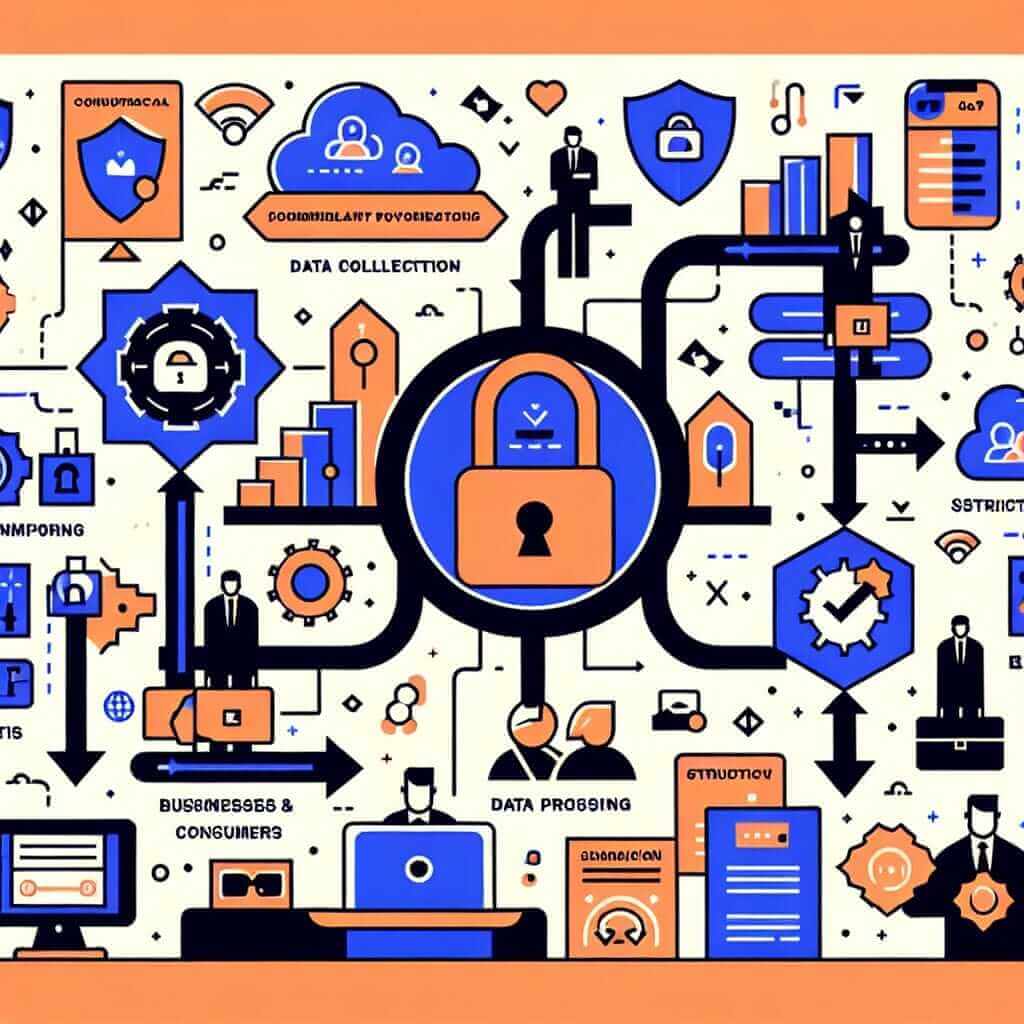Online privacy regulations have become a prominent subject of discussion in our digital age. As technology advances, so does the need to protect users’ personal information. The topic has appeared in IELTS Writing Task 2 exams, and it’s predicted to be even more relevant in future tests due to growing concerns about data breaches and privacy rights.
From previous IELTS exams, topics related to online privacy have been assessed numerous times. Examples include discussions on data protection, the role of governments in regulating the internet, and the balance between privacy and security. Given the increasing importance of online privacy, it’s vital for IELTS candidates to be prepared to discuss this issue comprehensively.
Three notable past questions on related topics include:
- Governments should regulate the internet to protect society. To what extent do you agree or disagree?
- In some countries, there are strict regulations on online content. Do you think this is effective in maintaining online security?
- Technology companies should ensure users’ privacy despite the benefits of data collection for businesses. Discuss both views and give your opinion.
For this exercise, we will focus on a synthesis of these past topics to provide a relevant and comprehensive model essay.
The increasing presence of online privacy regulations disrupts both individuals and businesses. Discuss the potential positive and negative effects of such regulations on society.
Analyzing the Prompt
The prompt requires a discussion of both positive and negative impacts of online privacy regulations on society. Key aspects to consider include the benefits of enhanced privacy protections for users and the potential drawbacks for businesses and individuals. The essay should present a balanced view, highlighting various perspectives and providing clear examples.
Model Essay
In recent years, the digital landscape has seen significant changes due to the implementation of online privacy regulations. These measures aim to safeguard personal information, but they also come with various advantages and disadvantages for individuals and businesses alike. This essay will explore both the beneficial and adverse effects of such regulations on society.
One of the primary benefits of online privacy regulations is the protection they offer to users’ personal data. With stringent laws in place, individuals are less likely to fall victim to identity theft, data breaches, and other cybercrimes. For example, the General Data Protection Regulation (GDPR) in the European Union has significantly increased transparency and control for users over their data. Such measures enhance trust between consumers and businesses, encouraging more people to engage in online activities without fear of misuse of their information.
Conversely, privacy regulations can pose challenges for businesses. Companies are often required to invest heavily in compliance measures, such as upgrading security systems and hiring data protection officers. These expenses can be particularly burdensome for small and medium-sized enterprises (SMEs) with limited resources. Moreover, the restrictions on data collection can hinder businesses’ ability to tailor services and products to consumers’ needs, potentially reducing market competitiveness and innovation.

On a broader scale, privacy regulations can create a more secure online environment, fostering public confidence in digital platforms. This trust is crucial for the growth of e-commerce, social media, and other internet-based services. For instance, clearer consent requirements and the right to access personal data empower users to make informed decisions about their online presence. Such empowerment can lead to increased user engagement and a more vibrant digital economy.
However, there are also negative implications for individuals. Compliance with privacy laws can result in restricted access to online content and services. For example, some websites and applications might limit their availability in regions with stringent data protection laws to avoid legal liabilities. This limitation can reduce the diversity of information and services accessible to users, potentially hindering personal and professional growth.
In conclusion, online privacy regulations have a dual impact on society, offering enhanced protection for users’ data while posing challenges for businesses and potentially restricting access to digital resources. It is essential for policymakers to strike a balance between protecting individual privacy and supporting innovation and accessibility in the digital world. (354 words)
Tips for Writing
Important Vocabulary and Phrases
- Data breach (noun) /ˈdeɪtə briːʧ/: An incident where information is accessed without authorization.
- Compliance (noun) /kəmˈplaɪəns/: The act of conforming to a rule, such as a law or regulation.
- Identity theft (noun) /aɪˈdɛntəti θɛft/: The fraudulent acquisition and use of a person’s private identifying information.
- Transparency (noun) /trænsˈpærənsi/: Openness, communication, and accountability.
- Liability (noun) /laɪəˈbɪlɪti/: The state of being responsible for something, especially by law.
Grammar Points
- Conditional Sentences: Used to discuss potential future scenarios (e.g., “If companies are required to comply, they must…”).
- Passive Voice: Useful for focusing on actions rather than the subject (e.g., “Users’ data is protected by laws”).
- Clauses of Contrast: To present opposing views (e.g., “While privacy laws protect users, they also…”).
- Cohesive Devices: Essential for linking ideas smoothly (e.g., “Moreover, Conversely, For example”).
Conclusion
The topic of online privacy regulations is highly pertinent and likely to appear in future IELTS exams due to growing concerns about data protection. This essay provides a balanced discussion, exploring the multi-faceted impacts of such regulations. Candidates should practice developing arguments on both sides of the issue and use relevant examples and cohesive devices to enhance their writing.
Potential future questions could include:
- Do you think that strict online privacy regulations should be implemented globally?
- How do online privacy regulations affect technological innovation?
By preparing comprehensively on this topic, IELTS candidates can enhance their readiness for various related prompts.